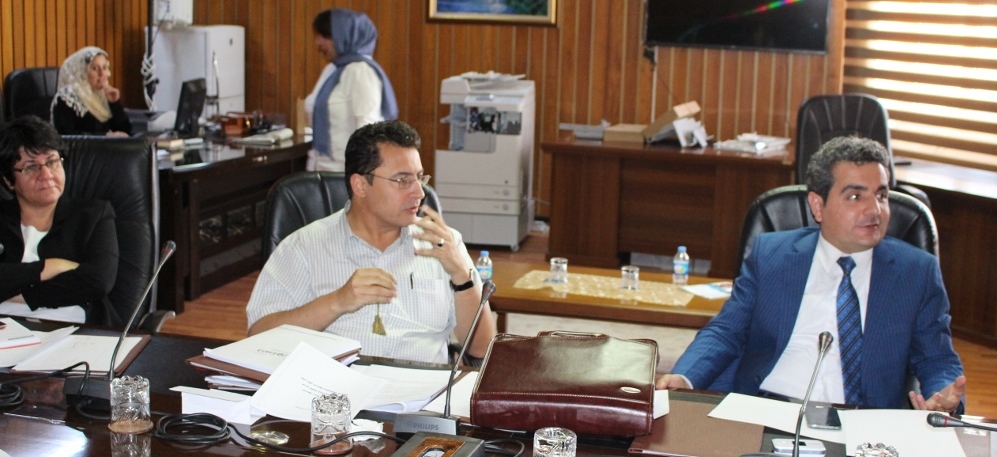In a meeting between MERI’s team, headed by its President, and the special parliamentary committee that is tasked to draft the future constitution of Kurdistan Region, the constitutional rights of ethnic and religious minorities were debated. The two sides emphasized the vital importance of enshrining the principles and practice of protecting the rights of all communities, no matter the size, in any future constitution. Addressing the concerns of minority groups will ensure greater levels of social cohesion.
MERI’s team provided the committee with the outcomes and conclusions of the recent study conducted in Kirkuk on the future of the Province. With Kurdistan Region’s Security Forces present in large areas of Kirkuk and the Disputed Territories, it is important for the fears and concerns of all communities to be allayed through confidence building measures such as legal and constitutional recognition of rights. MERI’s research indicate that one of the major problems in Kirkuk that blocks moving forward towards any solution is the absence of trust among the communities. Constitutional rights may well serve as an important tangible measure that can increase the potential of bringing the communities together with better levels of trust.
 To this end MERI’s team reiterated that a very important step for the Kurds to win the trust of the Turkmens, Arabs and Christians in Kirkuk is the provision of constitutional rights; adding “Kurds should implant for the minorities in Kurdistan Region’s constitution what they wanted to be enshrined in the Iraqi constitution.” This should include incorporating the minorities’ symbols in the Kurdistan Region’s flag and national anthem, officially recognizing their distinct languages, promoting their cultural heritage and guaranteeing their right of power-sharing and active role in the overall decision-making process.
To this end MERI’s team reiterated that a very important step for the Kurds to win the trust of the Turkmens, Arabs and Christians in Kirkuk is the provision of constitutional rights; adding “Kurds should implant for the minorities in Kurdistan Region’s constitution what they wanted to be enshrined in the Iraqi constitution.” This should include incorporating the minorities’ symbols in the Kurdistan Region’s flag and national anthem, officially recognizing their distinct languages, promoting their cultural heritage and guaranteeing their right of power-sharing and active role in the overall decision-making process.
Professor Dlawer Ala’Aldeen, President of MERI, emphasized the importance of the task shouldered by the committee while at the same time referring to its sensitivity. He stated that “the different ethnic and religious minorities are closely watching what it is being written while drafting the constitution in relation to their rights.” He also mentioned that the marginalization of communities, whether perceived or real, will only lead to social discord. To avoid this, the Kurdistan Region must build on its reputation as a protector of minorities and guarantee the social, political and cultural rights of all ethno-religious communities.
Present at the meeting was the head of the Committee, Mr. Shorsih Haji, and a large number of committee members, including experts representing different political parties and the Kurdistan Region’s diverse ethnic communities. Besides valuing MERI’s efforts in initiating important projects, the majority of the attendees agreed with the points raised by MERI’s team with regards to the rights of the minorities to be incorporated in the constitution.
ankara escort
çankaya escort
ankara escort
çankaya escort
escort ankara
çankaya escort
escort bayan çankaya
istanbul rus escort
eryaman escort
escort bayan ankara
ankara escort
kızılay escort
istanbul escort
ankara escort
ankara rus escort
escort çankaya
ankara escort bayan
istanbul rus Escort
atasehir Escort
beylikduzu Escort
* * * * *
About MERI: The Middle East Research Institute is Iraq’s leading policy-research institute and think tank. It is an independent, entirely grant-funded not-for-profit organisation, based in Erbil, Kurdistan Region. Its mission is to contribute to the process of nation-building, state-building and democratisation via engagement, research, analysis and policy debates.
MERI’s main objectives include promoting and developing human rights, good governance, the rule of law and social and economic prosperity. MERI conduct high impact, high quality research (including purpose-based field work) and has published extensively in areas of: human rights, government reform, international politics, national security, ISIS, refugees, IDPs, minority rights (Christians, Yezidis, Turkmen, Shabaks, Sabi mandeans), Baghdad-Erbil relations, Hashd Al-Shabi, Peshmarga, violence against women, civil society. MERI engages policy- and decision-makers, the civil society and general public via publication, focused group discussions and conferences (MERI Forum).

